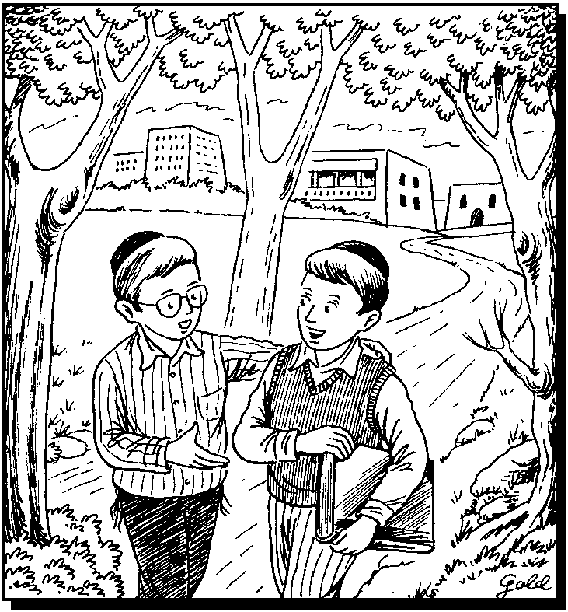The Hebrew months offer a unique window into the annual cycle of memory in Jewish life. To learn about any one month is to learn about what happened
in those days at this time.
Today (sundown Sunday through sundown Monday) is the 18th of
Tevet. Tevet has the last two days of Chanukah at its beginning, but soon becomes a month of sorrowful events.
There are three fast-days, the
8th,
9th, and
10th come next in the month. Though few Jews who are not orthodox fast at all outside of Yom Kippur, even fewer observe the fasts on the 8th and 9th. On the 10th of tenet, Jerusalem's walls were breached by Nebuchadnezzar, a step preceding the destruction of the temple some months later in Av.
These are all days of mourning. One for the integrity of Jerusalem (the 10th). Another to mourn the passing of community leaders (the 9th). And a third mourns the integrity of Hebrew culture (the 8th). That last one interests me, as a Rabbi who seeks to serve all people, and as someone who first encountered spiritual and Torah principles in translation.
The great calamity on the 8th of tevet was the completion of the translation of the Tanach into Greek. According to the
Orthodox Union:
...though the [translation of the Tanach] evoked general wonder in non-Jewish eyes, the day was nevertheless a very tragic day. The sages call it as tragic a day for Israel as the day on which the Golden Calf was made. In Megilat Ta'anit, the Sages described the event as follows:
On the 8th of Tevet, the Torah was rendered into Greek during the days of King Ptolemy, and darkness descended upon the world for three days.' To what may the matter be likened? To a lion captured and imprisoned. Before his imprisonment, all feared him and fled from his presence. Then, all came to gaze at him and said, 'Where is this one's strength?
Yikes. The rest of the month isn't much better. There is one overwhelmingly positive attribute to the month. Upon the very first day of Tevet, Esther was made queen in Shushan. The Purim story is one of inversion. And it also harps on and plays on the benefits and dangers of assimilation. Esther, like Moses, could pass for a non-Hebrew. Moses of course spent his first years of life being raised in Pharaoh's court. Though he fled after defending a Hebrew slave, his return and choice as leader for the Exodus was intimately tied to Moses's non-Hebrew experience.
Esther of course is an inverse of this. She is raised as a Jew in Persia, the time is after the destruction of the
first temple. Her identity is not hidden from herself. In fact, in her moment of leadership, she must take hide her identity, to pass. The initiation of Moses's leadership has him coming out loud and clear as an advocate for the Gd of the Hebrew people. Esther too must eventually reveal herself as Jewish to the King Ahashverosh, but in her case, it is a last resort.
And of course, the tension persists. How Jewish is, 'too Jewish'? How much assimilation will make Bubbe roll in the grave? When is it right to reveal your true inner self, and when is it best to just keep your head down? I wish that these were concerns of the distant past that we only read about in holy books, but alas, there is still much hatred for Jews in much of the world -
in some places more overt than
others.
Remember, though Esther's placement as Queen
did provide for the salvation of the Jewish community, that salvation was only required because of a bigoted government policy motivated by ignorance and spite that aimed at exterminating the Jewish population.
Our modern lesson, I think, encourages us to be optimistic. My lesson is in itself an inversion. My evidence is not that the old traditions are incorrect, that anti-semitism is fading, etc. My evidence tells me that this is something of a perennial issue. It is less a matter of we Jews and what we say and do, and much more a function of the overall health of society. I would note that on the 17th of Tevet in 1728 the first synagogue was founded in New York, a metro area that is now home to something just shy of a quarter of world Jewry. On the 26th of Tevet in 1826, the Maryland legislature passed a bill allowing Jews to hold public office (though you would think the US constitution would have provided for that, in the antebellum years the Feds' reach wasn't quite what we're used to).
The utter lack of good news in Tevet, with the shining exceptions planted firmly in the United States, leads me to think that we as a people can survive just about anything the world has to throw at us; we simply have no choice. And that what the world has to throw at us in the US, though not perfect, is more than adequate for now. Tevet is that helpful moderator. It reminds us that we can survive, but cautions us to be sure that we take care in doing so.
A post-lude - New Year's Eve in the secular calendar usually falls during Tevet, as we see it does this year. A happy and healthy new year to everyone. May this be a year filled with blessing and joy. May you love hard and live free. See you in 2013.




